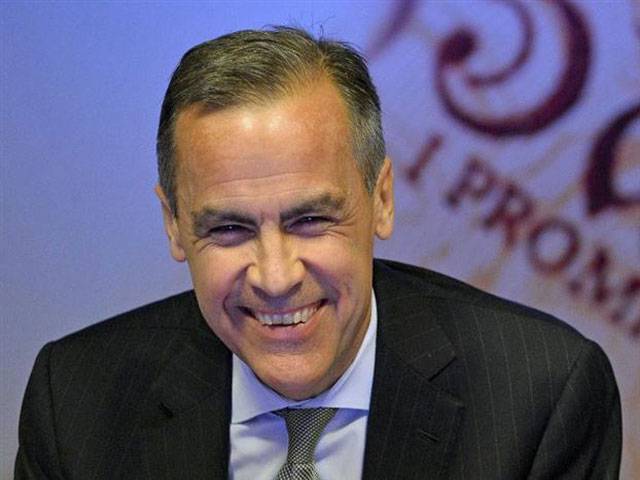LONDON - Britain’s economic recovery “has finally taken hold”, the Bank of England said on Wednesday as it upgraded its growth forecasts despite headwinds from the eurozone debt crisis.
The BoE added that unemployment could fall faster than expected, signalling that its key interest rate could rise from the current record-low level sooner than anticipated.
However, the central bank warned that the eurozone debt crisis would continue to cloud the outlook, adding that it would remain “vigilant” over buoyant domestic house prices.
“For the first time in a long time, you don’t have to be an optimist to see the glass as half full. The recovery has finally taken hold,” BoE governor Mark Carney told a press conference as he unveiled the bank’s latest quarterly economic forecasts.
The bank’s report added: “The external environment continues to pose the greatest threat to the recovery; in particular, the necessary adjustments to indebtedness and competitiveness within the euro area may yet prove to be a much greater drag on growth.
“At home, the continuing need for adjustment and balance sheet repair in both public and private sectors may mean that the recent boost to growth from the lifting of uncertainty proves short-lived.”
Britain is a member of the European Union but not of the eurozone, but the single currency bloc is its major trading partner.
Carney meanwhile pledged that the BoE would maintain its “exceptional monetary stimulus” with its so-called quantitative easing programme, under which it has pumped £375 billion ($598 billion, 446 billion euros) into the economy since March 2009 to boost lending and growth.
By contrast, markets expect the US Federal Reserve central bank to begin withdrawing its stimulus very shortly amid a pick-up for the US economy.
Recovery to speed up in next two years
The British economy was expected to grow by about 1.6 percent this year, the BoE said on Wednesday. That marked an upgrade from the previous estimate of 1.4 percent made in August.
It also lifted its prediction for 2014 growth to around 2.8 percent from 2.5 percent previously.
The economy had expanded by 0.8 percent in the third quarter, or July-September period, growing by the fastest rate for more than three years.
“The economy is growing robustly as lifting uncertainty and thawing credit conditions start to unlock pent-up demand,” the BoE said in its report.
“But significant headwinds — both at home and abroad — remain, and there is a long way to go before the aftermath of the financial crisis has cleared and economic conditions normalise.”
The BoE forecast also that Britain’s unemployment rate was expected to drop to a key threshold of 7.0 percent by the third quarter of 2015. That was about nine months sooner than previously flagged.
The bank does not plan to raise its interest rate from 0.50 percent until the unemployment rate falls to at least the threshold, under so-called “forward guidance” policy launched by Carney in August shortly after he became governor.
“It is important to remember that the unemployment threshold is a staging post for assessing policy, not a trigger for an automatic increase in bank rate,” the Canadian said on Wednesday.
“When the threshold is reached... (the BoE) will set policy to balance the outlook for inflation against the need to provide continued support to the recovery in output and employment.”
Official data released on Wednesday showed that Britain’s unemployment rate had fallen to a four-year low point. Unemployment dropped to 7.6 percent in the three months to September from 7.7 percent in the quarter ending in August, the Office for National Statistics said.
The BoE added on Wednesday that 12-month British inflation was on course to fall to its government-set target of 2.0 percent over the next year or so.
Tuesday, April 16, 2024
Bank of England proclaims Britain’s economic recovery

IHC dismisses Bushra Bibi's plea seeking her shifting to Adiala Jail from Bani Gala
4:25 PM | April 16, 2024
Punjab CM visits Tehsil Headquarter Hospital Murree
3:25 PM | April 16, 2024
High-level Saudi delegation in Islamabad to hold meetings with Pakistani leadership
2:07 PM | April 16, 2024
Saudi foreign minister meets PM Shehbaz Sharif
1:17 PM | April 16, 2024
Decision to retaliate against Iran attacks rests with Israel, says Pentagon
1:05 PM | April 16, 2024
Political Reconciliation
April 16, 2024
Pricing Pressures
April 16, 2024
Western Hypocrisy
April 16, 2024
Policing Reforms
April 15, 2024
Storm Safety
April 15, 2024
Democratic harmony
April 16, 2024
Digital dilemma
April 16, 2024
Classroom crisis
April 16, 2024
Bridging gaps
April 16, 2024
Suicide awareness
April 15, 2024
ePaper - Nawaiwaqt
Advertisement
Nawaiwaqt Group | Copyright © 2024





